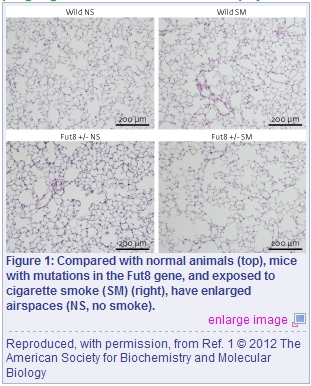기술동향
Upping the odds of developing emphysema
- 등록일2012-10-22
- 조회수6154
- 분류기술동향 > 종합 > 종합
-
자료발간일
2012-10-19
-
출처
Riken Research
- 원문링크
-
키워드
#emphysema# key lung protein #COPD# pulmonary
Upping the odds of developing emphysema
Lower levels of a key lung protein increase the risk of developing cigarette-smoke-induced emphysema

Cigarette smoking is a major risk factor for emphysema, one of the leading symptoms of chronic obstructive pulmonary disease (COPD). Each year, this deadly condition kills more than three million people worldwide. Yet, despite the irreversible cell damage wrought by tobacco smoke, around only one in five lifelong smokers develop the degenerative lung disease. This indicates that some people have genetic factors that predispose them to the condition, whereas others harbor DNA variants that offer protection. Now, a research team from the RIKEN Advanced Science Institute in Wako, Japan, has discovered one gene implicated in vulnerability to smoke-induced emphysema1, a finding that could help doctors identify those cigarette smokers at highest risk of end-stage chronic lung disease.
Led by Naoyuki Taniguchi, the research team previously showed that eliminating a gene called alpha1,6-fucosyltransferase (Fut8) led to lung-destructive characteristics in mice2. Fut8 is involved in making a simple sugar structure known as ‘core fucose’, which helps to maintain alveolar structure in the lung. Although the animals typically died within days of birth, the work suggested that perturbation of this gene could lead to emphysema.
To investigate this possibility further, Taniguchi’s team, together with collaborators at Japan’s Gunma University, exposed mice with only one functional of the Fut8 gene to cigarette smoke. These animals experienced a rapid influx of inflammatory cells in the lungs and developed emphysema after only three months. In contrast, wild-type mice needed at least six months of smoke inhalation to trigger the disease (Fig. 1). The researchers also found that core fucose controls proteins involved in the so-called ‘Smad pathway’, which in turn regulate the activity of enzymes involved in breaking down the extracellular matrix along the lung alveolar wall.
To validate the work in people, Taniguchi and his colleagues teamed up with clinicians at the Nippon Medical School and measured FUT8 protein levels in the blood of ex-smokers. They found that people with lower FUT8 activity had worse lung function on average and experienced more acute exacerbations of COPD than people with elevated FUT8 levels3. An independent Japanese team also reported last year that a particular genetic variant in the FUT8 gene was significantly associated with COPD.
Together, these results make a compelling case for measuring FUT8 levels in blood to help predict rates of disease progression in COPD patients. “Our study clearly indicated FUT8 enzyme activity is a biomarker for COPD exacerbations,” Taniguchi says, “and provides useful information for personalized medicine in terms of COPD exacerbations.”
The corresponding author for this highlight is based at the Systems Glycobiology Research Group, RIKEN Advanced Science Institute
- Gao, C., Maeno, T., Ota, F., Ueno, M., Korekane, H., Takamatsu, S., Shirato, K., Matsumoto, A., Kobayashi, S., Yoshida, K., et al. Sensitivity of heterozygous α1,6-fucosyltransferase knock-out mice to cigarette smoke-induced emphysema: implication of aberrant transforming growth factor-β signaling and matrix metalloproteinase gene expression. Journal of Biological Chemistry 287, 16699?16708 (2012). article
- Wang, X., Inoue, S., Gu, J., Miyoshi, E., Noda, K., Li, W., Mizuno-Horikawa, Y., Nakano, M., Asahi, M., Takahashi, M., et al. Dysregulation of TGF-beta1 receptor activation leads to abnormal lung development and emphysema-like phenotype in core fucose-deficient mice.Proceedings of the National Academy of Sciences USA 102, 15791?15796 (2005). article
- Kamio, K., Yoshida, T., Gao, C., Ishii, T., Ota, F., Motegi, T., Kobayashi, S., Fujinawa, R., Ohtsubo, K., Kitazume, S., et al. α1,6 Fucosyltransferase (Fut8) is implicated in vulnerability to elastase-induced emphysema in mice and a possible non-invasive predictive marker for disease progression and exacerbations in chronic obstructive pulmonary disease (COPD). Biochemical and Biophysical Research Communications 414, 112-117 (2012). article

